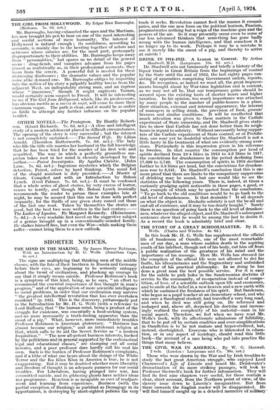SHORTER NOTICES.
THE MIND IN THE MAKING. By James Harvey Robinson. With an Introduction by H. G. Wells. (Jonathan Cape. 6s. net.) The signs are multiplying that thinking men of the middle classes, with the fate of their brethren in Russia and Germany before their eyes, are beginning to be seriously unhappy about the trend of civilization, and plucking up courage to say that it simply means suicide. Professor Robinson's book is a symptom of this kind, being, as he says, " an effort to recommend the essential importance of free thought in man's progress," and of the application of more scientific intelligence to social problems, in order that our civilization may survive " the greatest intellectual revolution that has ever overtaken mankind " (p. 242). This is the discovery, picturesquely put in the Introduction by Mr. H. G. Wells (with a reference to Lord Balfour), that " the human mind, being a product of the struggle for existence, was essentially a food-seeking system, and no more necessarily a truth-finding apparatus than the snout of a pig." What, however, more immediately troubles Professor Robinson is American plutocracy. " Business has almost become our religion," and an intolerant religion at that, which calls to its aid the Secret Service as " a modern Inquisition." " The now all-potent business interests, backed by the politicians and in general supported by the ecclesiastical legal and educational classes," are stamping out all social heresies, and a poor professor dare hardly call his soul his own. Such is the burden of Professor Robinson's complaints, and if a tithe of what one hears about the doings of the White Terror and the Ku Klux Klan in America is true, he is not exaggerating. But it may be doubted whether more liberality and freedom of thought is an adequate panacea for our social troubles. For Liberalism, having plunged into war, has committed suicide, and its gibbering ghosts have neither ideas nor programme. Reaction is as incapable as ever of readjust- ment and learning from experience. Business (with the partial exception of Banking) as purblind as Demagogy in its opportunism, is destroying bby short-sighted policies the very
trade it seeks. Revolution cannot feed the masses it emanci.- pates, and the one new force on the political horizon, Fascism, prognosticates nothing but a reign of the machine-gun and the powers of the air. So it may presently occur even to some of our less advanced thinkers that something has gone badly wrong with the human intelligence, and that somehow it is no longer up to its work. Perhaps it may be a mistake ta use it merely like the snout of a pig, and thereby to arrive at suicide I


























































 Previous page
Previous page